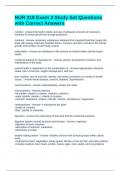NUR 218 Exam 3 Study Set Questions
with Correct Answers
nutrition - Answer-the body's intake and use of adequate amounts of necessary
nutrients for tissue growth and energy production
nutrients - Answer-necessary substances obtained from ingested food that supply the
body with energy; build and maintain bones, muscles, and skin; and aid in the normal
growth and function of each body system
malnutrition - Answer-an imbalance in the amount of nutrient intake and the body's
needs
nutritional balance in important for: - Answer-growth, development, function, and
maintenance of the body
overall health is dependent on the combination of: - Answer-appropriate nutritional
intake, lack of exercise, weight management, and rest
poor nutrition, lack of exercise, obesity, and stress contribute to a variety of health
issues: - Answer-heart disease, cancers, diabetes, hypertension
macronutrients - Answer-carbohydrates, protein, fat, water
micronutrients - Answer-vitamins
-fat soluble: vitamin a, vitamin, vitamin e, vitamin k
-water soluble: vitamin c, vitamin b complex
-minerals: potassium, sodium, chloride, calcium, phosphorus, magnesium
carbohydrates - Answer--4 kilocalories per gram
-simple or complex
-fiber: soluble or unsoluble
digestion - Answer-the processing of food and fluid for nutritional purposes
digestive system normal structure and function - Answer--ingestion
-digestion of food: enzymes
-absorption of nutrients: catabolism
-elimination of waste
healthy eating pattern - Answer--healthy choices from all food groups within calorie
limits
-emphasized fruits, vegetables, whole grains, fat-free or low-fat milk, and milk products
-includes seafood, lean meats, poultry, beans, eggs, nuts, seeds, and soy products
,-low in saturated fats, trans fats, sodium, and added sugars
nutrition: altered structure and function - Answer--poor nutritional intake
-inadequate exercise
-lack of rest
-impacts growth and development in children and adolescents
-causes serious health concerns in adults
altered nutrition: inadequate nutrition affects multiple systems - Answer--
musculoskeletal
-neurologic
-cardiopulmonary
-digestive system
-skin and hair
-labs
altered nutrition: metabolic alterations - Answer--diabetes
-allergies and intolerances
-obesity
-malnutrition
altered nutrition: psychological - Answer--anorexia nervosa
-bulimia nervosa
clear liquid diet - Answer--liquids which can be seen through, no pulp (apple juice,
water, popsicles, clear broths)
-clear liquid has limited nutrients and is used only for a short period
-commonly ordered for patients with GI problems, preop, postop, and prior to some
diagnostic tests
full liquid diet - Answer--foods that are or may become liquid at body temperature (jello,
custard, popsicles)
-full-liquid diets include juices with and without pulp, milk and milk products, yogurt,
strained cream soups, and liquid dietary supplements
-such diets are often used to advance patients who have GI disturbances, just had
dental work performed, or who cannot tolerate solid food
pureed diet - Answer--blended
-consist of food that is placed into a blender and made into a pulp-like mixture
-this type of diet is used for persons who cannot safely chew or swallow solid food
(stroke victims, any condition that causes dysphagia)
mechanical soft diet - Answer--modified food consistency
-thickened liquids: for dysphagia and risk of aspiration (nectar thick, honey thick,
pudding thick)
-avoid hard nuts or seeds to reduce risk of aspiration
, diabetic (ADA) diet - Answer--prescribed to control the amount of calories by controlling
carbohydrate intake
-foods with a glycemic index raise blood sugar levels, requiring more insulin, therefore
these foods should be decreased
-high-fiber complex carbohydrates from vegetables and fruits are preferred to simple
carbohydrates, sugars, and starchy foods such as bread or pie
cardiac diet - Answer--low cholesterol, low sodium
-control intake of foods that contribute to conditions affecting cardiovascular system
-minimize animal products (cholesterol), soups and processed foods (sodium)
-pt. with HTN, high cholesterol, atherosclerosis, chronic renal failure, or similar diseases
may be placed on some type of cardiac (low cholesterol, low Na) diet
renal diet - Answer--restrict potassium, sodium, protein, and phosphorus intake
-encourage fresh fruits (except bananas) and vegetables
-small quantities/contraindicated: meats, processed foods, peanut butter, cheese, nuts,
caramels, ice cream, colas
-no gatorade/powerade
NPO patients cannot receive anything by mouth - Answer-common preop and postop;
GI bleeding or intestinal blockage
NPO patients mouth care - Answer--brushing teeth, flossing, mouthwash
-unconscious pt need special attention
-place pt on side to allow for drainage
precautions are taken to prevent materials from entering the lungs of at-risk pt instead
of being swallowed - Answer-food, fluid, saliva, other foreign objects
to determine whether there is a risk of aspiration: - Answer--consult the nutritional
therapist
-consult the speech therapist
-swallow study
conditions that place pt. at risk - Answer--seizures
-stroke
-dementia
-gastroesophageal reflux disease (GERD)
-cerebral palsy, muscular dystrophy, multiple sclerosis, parkinson disease, and other
diseases affecting mobility
-meds with a sedative or muscle relaxant effect, including anesthesia
-feeding of the pt by another person or an eating pattern that is too fast
pt at risk for aspiration should be monitored for - Answer-coughing, wheezing, dyspnea
(SOB), apnea, bradycardia, hypotension




